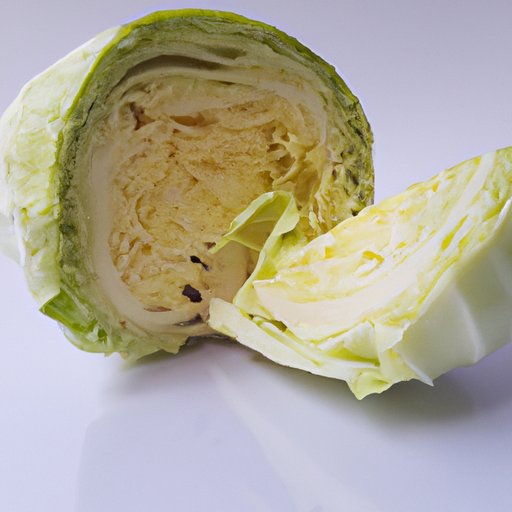Introduction
Cabbage is an incredibly nutritious vegetable that has been enjoyed by cultures around the world for centuries. It’s packed with vitamins, minerals, and other essential nutrients that are beneficial to our overall health and wellbeing. Despite this, some people struggle to incorporate cabbage into their diets, as they may not know what dishes to make with it or how to prepare it. In this article, we’ll explore the health benefits of cabbage, as well as provide some recipes and meal ideas so you can make the most of this wonderful vegetable.
Exploring the Health Benefits of Cabbage
Cabbage is an excellent source of vitamins, minerals, and other essential nutrients that can benefit your health in various ways. It’s low in calories but high in fiber, which can help you feel fuller for longer and aid digestion. Cabbage also contains antioxidants and anti-inflammatory compounds which may help boost your immune system and protect against certain illnesses. Additionally, research suggests that eating cabbage may help reduce the risk of developing certain types of cancer.

A Closer Look at the Nutritional Content of Cabbage
Cabbage is rich in vitamins and minerals, including vitamin C, vitamin K, folate, potassium, and magnesium. It’s also a good source of fiber, which can help keep your digestive system healthy and promote regular bowel movements. One cup of cooked cabbage (100g) contains approximately 30 calories, 1.7 grams of protein, 0.1 grams of fat, and 6.6 grams of carbohydrates.

How to Incorporate Cabbage Into Your Diet
Cabbage is versatile and can be used in a variety of dishes. You can use it raw in salads or coleslaw, or cooked in soups, stews, stir-fries, and casseroles. It can also be steamed, boiled, or roasted for a delicious side dish. Here are some simple recipes and meal ideas to get you started:
- Add shredded cabbage to tacos or burritos for an extra crunch.
- Stir-fry cabbage with vegetables and serve over rice or noodles.
- Make a vegetarian-friendly soup with cabbage, beans, and spices.
- Sauté cabbage with garlic, ginger, and soy sauce.
- Roast cabbage wedges with olive oil, salt, and pepper.
When preparing cabbage, make sure to remove any bruised or wilted leaves. Cut the cabbage into smaller pieces to help it cook faster and retain more nutrients. When cooking cabbage on the stovetop, use a large pot with plenty of water and add the cabbage after the water comes to a boil. You can also steam or roast cabbage in the oven.
The Pros and Cons of Eating Cabbage
Eating cabbage has numerous potential benefits, such as providing essential vitamins and minerals, aiding digestion, and reducing the risk of certain illnesses. However, there are also some possible risks associated with eating cabbage. For example, cabbage contains goitrogens, which can interfere with thyroid hormone production if eaten in large amounts. Additionally, some people may be sensitive to certain compounds found in cabbage, which could lead to digestive issues such as bloating, gas, and abdominal pain.

The Role of Cabbage in a Healthy Lifestyle
Eating a balanced diet is important for maintaining optimal health. A balanced diet should include a variety of fruits, vegetables, whole grains, lean proteins, and healthy fats. Eating vegetables like cabbage is especially important, as they are packed with essential vitamins, minerals, and other nutrients that are beneficial to our overall health and wellbeing. Additionally, eating vegetables can help you reach and maintain a healthy weight, as they are low in calories and high in fiber.
Conclusion
Cabbage is an incredibly nutritious vegetable that provides essential vitamins, minerals, and other nutrients that can benefit our health in various ways. It’s low in calories but high in fiber, which can help us feel fuller for longer and aid digestion. Plus, cabbage contains antioxidants and anti-inflammatory compounds which may help boost our immune system and protect against certain illnesses. With the right recipes and meal ideas, it’s easy to incorporate cabbage into your diet and reap the many health benefits it has to offer. Eating a balanced diet that includes a variety of fruits, vegetables, and other healthy foods is key to maintaining a healthy lifestyle.
(Note: Is this article not meeting your expectations? Do you have knowledge or insights to share? Unlock new opportunities and expand your reach by joining our authors team. Click Registration to join us and share your expertise with our readers.)
